Jean-louis Dessalles - Publications [See all papers] - [Selected Papers] - [Talks]
See also Books:
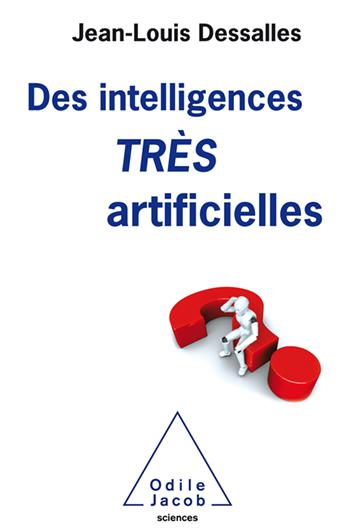
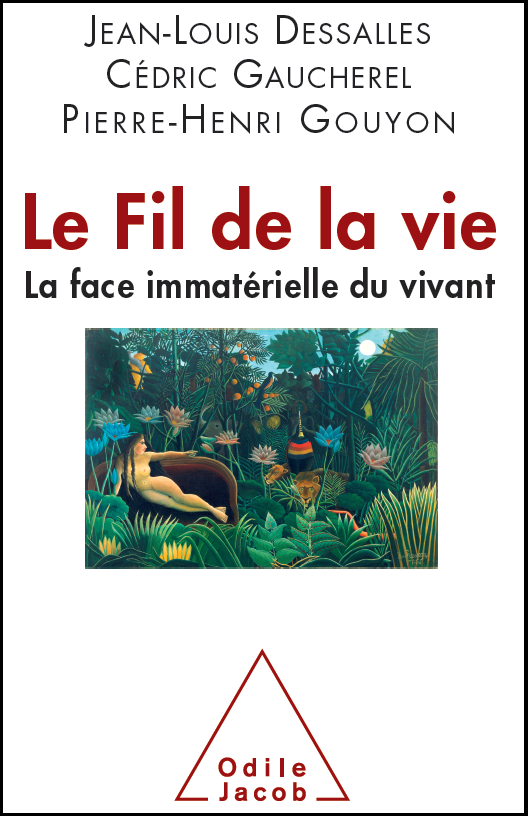
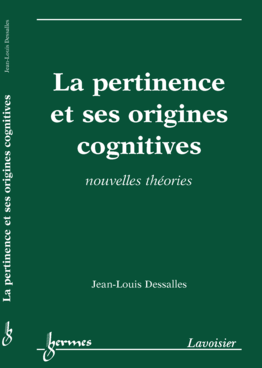
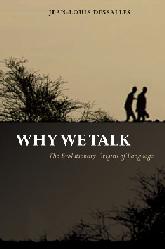
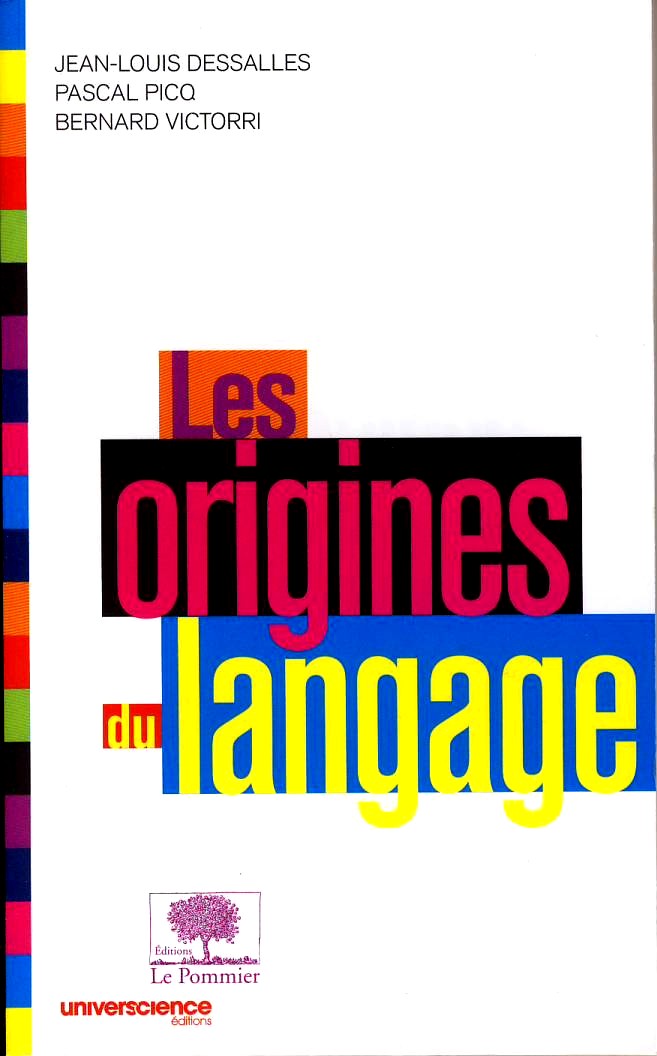
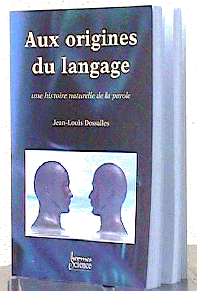
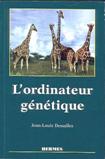
 Topics
Topics
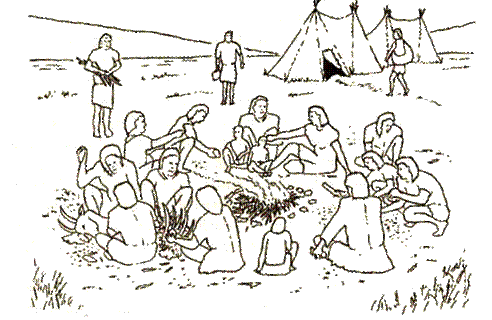 Social signals
Social signals
Evolutionary origins of language
Evolution and information
Simplicity Theory
Cognitive modelling of interest
Cognitive modelling of relevance
Cognitive modelling of meaning
Cognitive modelling of emotional intensity
Cognitive modelling of concept learning
Emergence as complexity drop
Qualia cannot be epiphenomenal
→ [ See all papers ] → [ Selected papers ]
Selected topic: Evolutionary origins of language
| I developed several arguments to show that human communication did not emerge as a form of cooperation. I am suggesting that the biological function of human language is to display qualities that are sought after when choosing profitable coalition partners. The ability to be relevant would be a crucial quality in the particular politics of our species. The consistency of the idea is tested through mathematical modelling and computer simulation. |
Regarder
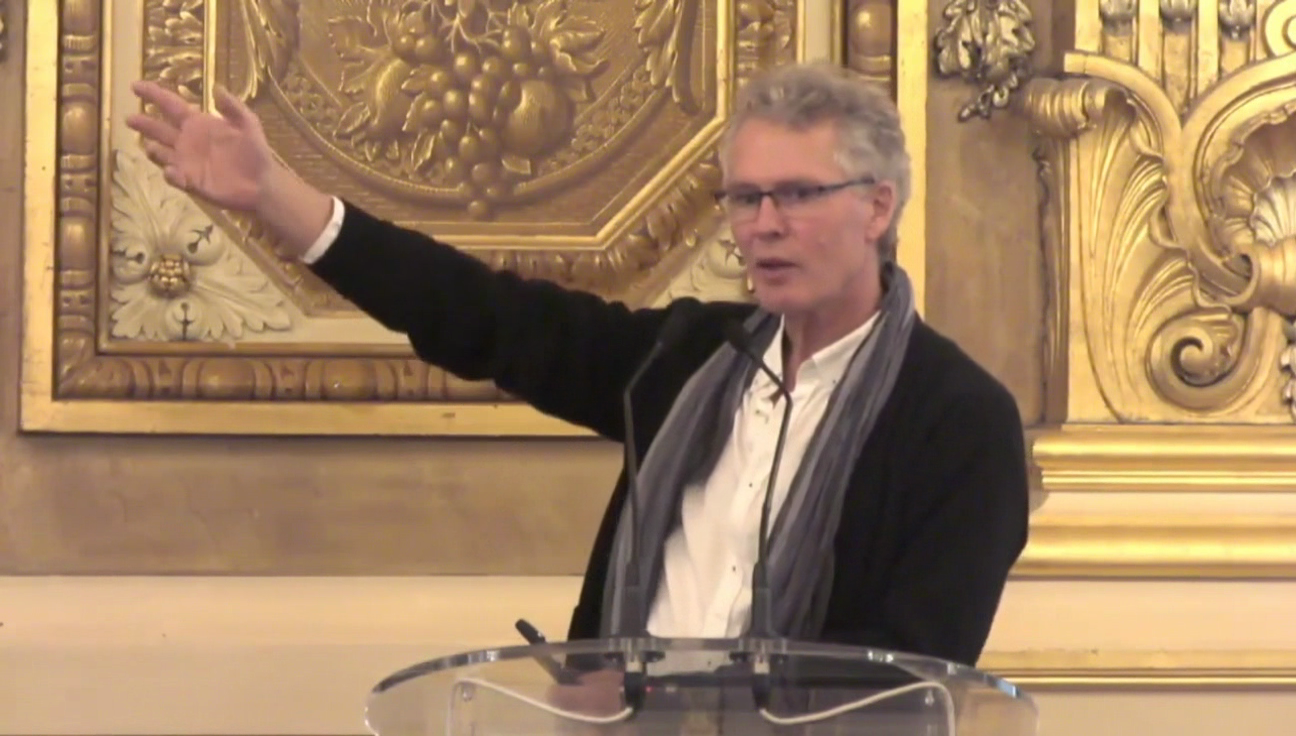
|
Exposé aux Entretiens de la Cité 2016 "Humain" à l’Hôtel de Ville de Lyon (5 novembre 2016).
Vidéo de la présentation: Et le langage créa l’être humain. |
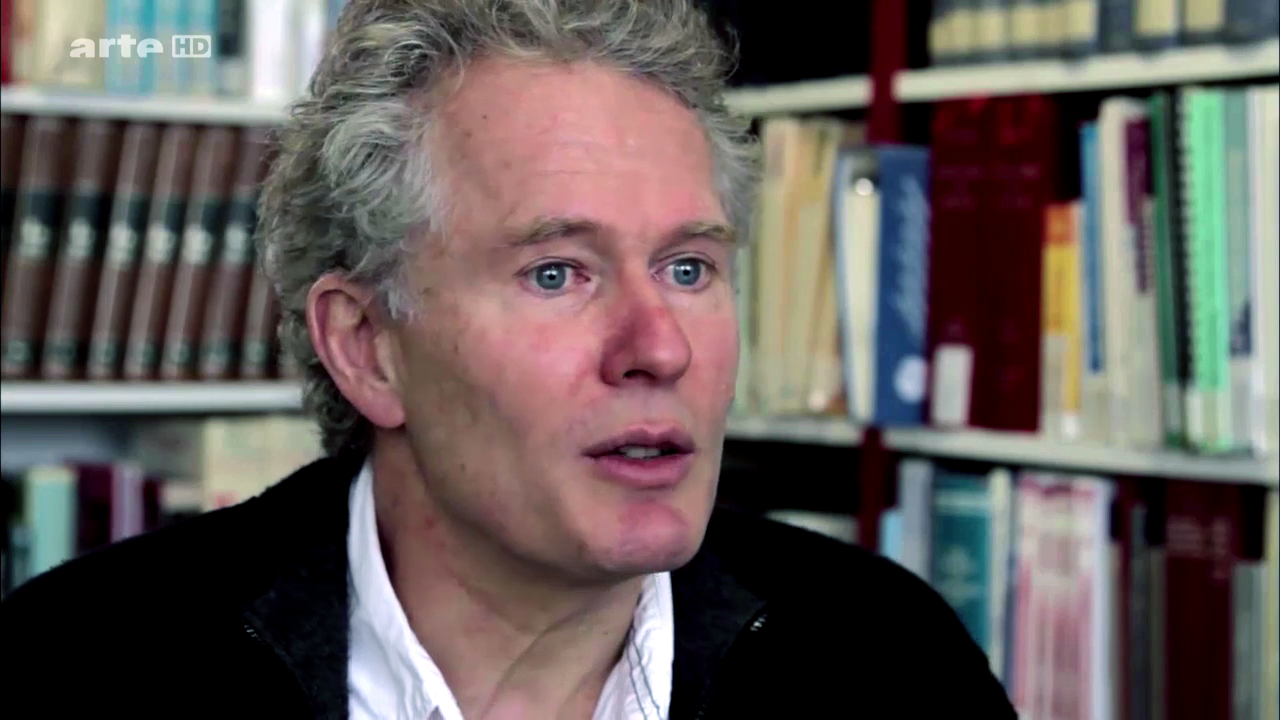
|
Interview dans le film d’Emmanuel Leconte et Franck Guérin, diffusé sur Arte le 14.07.2015 |
My 57 papers about EVOL.&LANG. (but see my other papers)
-
Dessalles, J.-L. (2020). Language: The missing selection pressure. Theoria et Historia Scientiarum, 17
Keywords: EVOL.&LANG.
Human beings are talkative. What advantage did their ancestors find in communicating so much? Numerous authors consider this advantage to be “obvious” and “enormous”. If so, the problem of the evolutionary emergence of language amounts to explaining why none of the other primate species evolved anything even remotely similar to language. I propose to reverse the picture. On closer examination, language resembles a losing strategy. Competing for providing other individuals with information, sometimes striving to be heard, makes apparently no sense within a Darwinian framework. At face value, language as we can observe it should never have existed or should have been counter-selected. In other words, the selection pressure that led to language is still missing. The solution I propose consists in regarding language as a social signaling device that developed in the social context that is unique to our species.
→ Download PDF Share: -
Dessalles, J.-L. (2016). Un phénomène biologique unique. TDC, 1106, 52-57.
Keywords: EVOL.&LANG.
LONGTEMPS considérée comme une question taboue par les scientifiques, l’origine du langage est devenue un thème à la mode. On peut s’en féliciter, tant il est au centre de ce qui nous distingue des autres animaux. Mais sachant que le langage ne laisse pas de fossiles, peut-on faire autre chose qu’émettre des hypothèses invérifiables à propos de son origine ?
→ Télécharger une version PDF de cet article Share: -
Dessalles, J.-L. (2016). Le protolangage : de quoi les hominidés parlaient-ils ? In A. Bertand (Ed.), Condillac, philosophe du langage ?, 27-54. Paris: ENS Editions.
Keywords: EVOL.&LANG.
L’un des grands mérites que l’on doit reconnaître à Condillac est d’avoir posé la question de l’origine du langage, à une époque où la réponse évidente de l’origine divine obscurcissait le champ de l’investigation scientifique. D’une évidence, il a fait une question, et cette question continue de nous hanter. L’enjeu, derrière la question de l’origine du langage, est de comprendre l’origine d’un ensemble facultés mentales par laquelle nous aimons à nous distinguer des autres animaux. De tous nos prédécesseurs, à travers les quelque trois cent mille générations qui nous séparent de nos ancêtres simiesques, lequel a émis la première phrase, le premier mot, le premier geste référentiel ? Pourquoi est-ce arrivé dans notre lignée, et seulement dans notre lignée ? Comment et pourquoi cette innovation s’est-elle amplifiée jusqu’à produire le langage tel qu’il est pratiqué actuellement par tous les êtres humains ? -
Dessalles, J.-L. (2014). Why talk? In D. Dor, C. Knight & J. Lewis (Eds.), The social origins of language, 284-296. Oxford, UK: Oxford University Press.
Keywords: EVOL.&LANG.
What is language good for? For a long time, the question has remained not only unanswered, but not even asked. The classic ‘reason’ invoked to avoid the issue was that language benefited the species as a whole. This way of reasoning is simply wrong (Williams 1966). If information has any value, it is in the interest of no one to give it for free. And if information has no value, why are there ears ready to listen to it? The reason why we talk, and so much, still requires a biological and social explanation.
→ Download PDF Share: -
Dessalles, J.-L. (2014). The role of the human political singularity in the emergence of language. In E. A. Cartmill, S. Roberts, H. Lyn & H. Cornish (Eds.), The evolution of language - Proceedings of the 10th International Conference (Evolang-X - Vienna), 423-424. World Scientific.
Keywords: EVOL.&LANG.
→ Download PDF Share:
→ Slides -
Dessalles, J.-L. (2014). Human language: an evolutionary anomaly. In T. Heams, P. Huneman, G. Lecointre & M. Silberstein (Eds.), Handbook of Evolution Theory in the Sciences, 707-724. London, UK: Springer.
Keywords: EVOL.&LANG.
Human beings devote a considerable share of their time, maybe one third of the day (Mehl & Pennebaker 2003:866), to sharing information with conspecifics about often futile but sometimes consequential topics. This behavior is unique in nature. How can we account for the existence of honest communication in a Darwinian world where individuals are inevitably in competition with each other? The task proves much harder than what was thought in the past decades. The problem should bother all scientists, and more broadly any person wondering about human nature.
→ Download PDF Share: -
Dessalles, J.-L. (2013). Du protolangage au langage : modèle d’une transition. In B. Fracchiolla (Ed.), Les origines du langage et des langues Paris: L’Harmattan.
Keywords: EVOL.&LANG. MEANING
L’existence des capacités syntaxiques qui permettent aux êtres humains de manier des langues complexes reste mystérieuse. Pour certains auteurs, ces capacités seraient apparues totalement par hasard au cours de l’évolution et leur application à la communication serait fortuite. Nous essayons ici de montrer comment la modélisation de l’interface syntaxe-sémantique permet d’envisager un tout autre scénario. L’aptitude à manier des structures syntaxiques serait apparue en deux temps et serait liée à une nouvelle capacité sémantique, la formation des prédicats. La récursivité serait apparue lors de la deuxième étape, comme un moyen de lier les prédicats entre eux pour permettre la détermination de leurs arguments.
→ Télécharger une version PDF de cet article Share: -
Dessalles, J.-L. (2011). Parler pour exister. Sciences humaines, 224, 45-47.
Keywords: NARRATIVE EVOL.&LANG.
Le langage ne vise pas seulement à transmettre des informations utiles. Il sert aussi à se mettre en valeur en racontant de bonnes histoires qui doivent répondre à des caractéristiques très précises.
→ Télécharger une version PDF de cet article Share: -
Dessalles, J.-L. (2011). Pragmatics and evolution. In P. C. Hogan (Ed.), The Cambridge encyclopedia of the language sciences, 649-651. Cambridge University Press.
Keywords: EVOL.&LANG.
For at least 100 000 years, human beings have been talking the way we do. Language is universally used by most individuals in every culture several hours each day, primarily during conversational chatter (Dunbar 1998). How did our species come to adopt such a strange behavior in the course of its evolution? The question has been considered in turn as obvious and baffling. A proper approach to the reasons why we talk requires that the biological function of language be understood, and pragmatics is the right place to seek out that function.
→ Download PDF Share: -
Dessalles, J.-L. (2011). The real mystery about language - Comment on "Modeling The Cultural Evolution of Language" by Luc Steels. Physics of life reviews, 8 (4), 369-370.
Keywords: EVOL.&LANG.
Human communication involves a huge cost. Conversation takes up about one third of our awake time; children must learn ten new words a day during ten years; getting first-hand information is time-consuming and may involve risks; and we need to support disproportionate brains to store episodes worth telling during verbal interactions. Why are we (apparently) the only species that shows this behavior, in apparent contradiction with Darwinian principles? This is the real mystery about language.
→ Download PDF Share: -
Dessalles, J.-L. (2011). Review of: "The evolution of human language: Biolinguistic perspectives" (R. Larson et al., CUP, 2010). Language, 87 (2), 411-414.
Keywords: EVOL.&LANG.
Where does human language come from? The ‘greatest problem in science’, according to Bickerton (2009), remains a mystery. This new volume offers a partial but important map of current ideas on the problem. The book is stimulating because of the issues it raises and surprising in the issues it ignores.
→ Download PDF Share: -
Dessalles, J.-L. (2011). Reasoning as a lie detection device (Commentary on Mercier and Sperber:’Why do humans reason? Arguments for an argumentative theory'). Behavioral and Brain Sciences, 34 (2), 76-77.
Keywords: ARGUMENTATION EVOL.&LANG.
The biological function of human reasoning abilities cannot be to improve shared knowledge. This is at best a side effect. A more plausible function of argumentation, and thus of reasoning, is to advertise one’s ability to detect lies and errors. Such selfish behavior iscloser to what we should expect from a naturally selected competence.
→ Download PDF Share: -
Dessalles, J.-L. (2010). Have you anything unexpected to say? The human propensity to communicate surprise and its role in the emergence of language. In A. D. M. Smith, M. Schouwstra, B. de Boer & K. Smith (Eds.), The evolution of language - Proceedings of the 8th International Conference (Evolang8 - Utrecht), 99-106. Singapore: World Scientific.
Keywords: EVOL.&LANG. SIMPLICITY
Individuals devote one third of their language time to mentioning unexpected events. We try to make sense of this universal behaviour within the Costly Signalling framework. By systematically using language to point to the unexpected, individuals send a signal that advertises their ability to anticipate danger. This shift in display behaviour, as compared with typical displays in primate species, may result from the use by hominins of artefacts to kill.
→ Download PDF Share: -
Dessalles, J.-L. (2010). L’émergence du langage au cours de l’évolution. In M. Banniard & D. Philps (Eds.), La fabrique du signe - Linguistique de l’émergence, 22-33. Toulouse: Presses Universitaires du Mirail.
Keywords: EVOL.&LANG.
Nous défendons ici l’idée que le langage humain est né d’une compétition inédite dans le monde animal, la compétition informationnelle. De nombreux aspects de notre mode de communication, notamment sa modalité essentiellement orale, ses lexiques pléthoriques, son caractère déplacé (hors du ‘ici et maintenant'), son mode dialogique, toutes choses parfaitement mystérieuses autrement, trouvent une explication dans le fait que les locuteurs sont engagés dans une compétition communicationnelle de laquelle les gagnants retirent un bénéfice social. Cette explication de l’émergence du langage ne se limite pas à imaginer un intérêt pour l’auditeur, mais également pour le locuteur. Elle est donc recevable dans un cadre darwinien.
→ Télécharger une version PDF de cet article Share: -
Dessalles, J.-L. (2010). Comment le langage est venu à l’homme. La Recherche, 445, 64-65.
Keywords: EVOL.&LANG.
Dans son dernier livre, le linguiste Derek Bickerton s’attaque à ce qu’il qualifie de "plus grande énigme de la science": l’origine du langage. Une faculté humaine radicalement différente de la communication animale, comme l’explique l’extrait présenté ici en avant-première.
→ Télécharger une version PDF de cet article Share: -
Dessalles, J.-L., Machery, E., McKenzie Alexander, J. & Cowie, F. (2010). Symposium on J.-L. Dessalles’s Why we Talk. Biology and philosophy, 25 (5), 851-901.
Keywords: EVOL.&LANG.
This symposium discusses J.-L. Dessalles’s account of the evolution of language, which was presented in Why we Talk (Oxford Univ. Press 2007).
→ Download PDF Share: -
Dessalles, J.-L. (2010). Préface. In D. Bickerton (Ed.), La langue d’Adam, v-ix. Paris: Dunod.
Keywords: EVOL.&LANG.
Certains chercheurs, probablement la vaste majorité, restent d’une grande prudence lorsqu’ils expriment leurs idées. Derek Bickerton n’est certainement pas de ceux-là. La prudence scientifique est un moyen de ne pas trop heurter la pensée, souvent contradictoire, des collègues. C’est aussi un moyen de ne pas prendre de risques, de ne pas se voir reprocher plus tard que l’on s’est trompé. Les demi-teintes, les nuances et les compromis conceptuels ne font pas partie du monde de Derek Bickerton. Dans ses écrits comme lors de ses interventions publiques, il montre une fougue et une prise de risque que nombre de jeunes chercheurs pourraient lui envier. Bickerton nous dit : « Voilà comment le langage humain a émergé ! ». Il nous dit même : « Pour la première fois, quelqu’un va vous dire comment le langage a émergé ». Il ne s’agit pas d’immodestie. Il s’agit de passion. Cette passion, il nous la communique, pour notre plus grand plaisir.
→ Télécharger une version PDF de cet article Share: -
Dessalles, J.-L. (2010). From metonymy to syntax in the communication of events. In M. A. Arbib & D. Bickerton (Eds.), The emergence of protolanguage - Holophrasis vs compositionality, 51-65. Amsterdam: John Benjamins Publishing Comp.
Keywords: EVOL.&LANG.
Language, from its early hominin origin to now, was not primarily being used for practical purposes. We suggest that an essential function of protolanguage was to signal ‘noteworthy’ events, as humans still systematically do. Words could not be so specific as to refer to whole, non-recurring, situations. They referred to elements such as objects or locations, and the communicated event was inferred metonymically. Compositionality was achieved, without syntax, through multi-metonymy, as words referring to elements of the same situation were concatenated into proto-utterances.
→ Download PDF Share: -
Dessalles, J.-L. (2009). Une anomalie de l’évolution : le langage. In T. Heams, P. Huneman, G. Lecointre & M. Silberstein (Eds.), Les mondes darwiniens - L’évolution de l’évolution, 863-882. Paris: Editions Syllepse.
Keywords: EVOL.&LANG.
Les être humains, dans leur milieu naturel, utilisent le langage pour bavarder. C’est lors de ce comportement étrange et faussement futile qu’ils constituent leur réseau social. Je montre comment cette fonction permet d’expliquer l’existence du langage dans un cadre darwinien. Je montre également pourquoi d’autres modèles, proposés dans le passé, échouent face aux contraintes darwiniennes
→ Télécharger une version PDF de cet article Share: -
Dessalles, J.-L. (2009). Why we talk - The evolutionary origins of language (2nd edition). Oxford: Oxford University Press.
Keywords: EVOL.&LANG.
Why do human beings tirelessly strive to provide information to conspecifics? Human language seems to benefit listeners more than speakers. It seems to be an exception in a Darwinian world in which organisms are primarily concerned with their own survival.
→ Get the book -
Dessalles, J.-L. (2008). Spontaneous narrative behaviour in homo sapiens: how does it benefit to speakers? In A. D. M. Smith, K. Smith & R. Ferrer i Cancho (Eds.), The evolution of language - Proceedings of the 7th International Conference (Evolang7 - Barcelona), 91-98. Singapore: World Scientific.
Keywords: EVOL.&LANG. NARRATIVE
The fact that human beings universally put much energy and conviction in reporting events in daily conversations demands an explanation. After having observed that the selection of reportable events is based on unexpectedness and emotion, we make a few suggestions to show how the existence of narrative behaviour can be consistent with the socio-political theory of the origin of language.
→ Download PDF Share: -
Dessalles, J.-L. (2008). Why is language well designed for communication? (Commentary on Christiansen and Chater: "Language as shaped by the brain"). Behavioral and Brain Sciences, 31 (5), 518-519.
Keywords: EVOL.&LANG.
Selection through iterated learning explains no more than other non-functional accounts, such as universal grammar, why language is so well-designed for communicative efficiency. It does not predict several distinctive features of language like central embedding, large lexicons or the lack of iconicity, that seem to serve communication purposes at the expense of learnability.
→ Download PDF Share: -
Dessalles, J.-L. (2008). From metonymy to syntax in the communication of events. Interaction Studies, 9 (1), 51-65.
Keywords: EVOL.&LANG.
Language, from its early hominin origin to now, was not primarily being used for practical purposes. We suggest that an essential function of protolanguage was to signal ‘noteworthy’ events, as humans still systematically do. Words could not be so specific as to refer to whole, non-recurring, situations. They referred to elements such as objects or locations, and the communicated event was inferred metonymically. Compositionality was achieved, without syntax, through multi-metonymy, as words referring to elements of the same situation were concatenated into proto-utterances.
→ Download PDF Share: -
Dessalles, J.-L. (2007). Humans and apes make friends differently: Implications for the evolutionary emergence of language. In P. M. Kappeler & M. Schwibbe (Eds.), Primate Behavior and human universals - Abstracts of the 6th Göttinger Freilandtage, 24-25. Göttingen: Primate Report.
Keywords: EVOL.&LANG. -
Dessalles, J.-L. (2007). Why we talk - The evolutionary origins of language (English edition of ‘Aux origines du langage'). Oxford: Oxford University Press.
Keywords: EVOL.&LANG.
Why do human beings tirelessly strive to provide information to conspecifics? Human language seems to benefit listeners more than speakers. It seems to be an exception in a Darwinian world in which organisms are primarily concerned with their own survival.
→ See the book Share:
→ Get the book -
Dessalles, J.-L., Picq, P. & Victorri, B. (2006). Les origines du langage. Paris: Editions Le Pommier.
Keywords: EVOL.&LANG.
Comment le langage est-il apparu ? Certes pas parce qu’il fallait que l’on parle... L’éthologie, la paléoanthropologie, la linguistique, servent ici de guides précieux dans une véritable enquête qui nous mène sur les traces des premiers humains. Existe-t-il des méthodes qui nous permettraient de reconstituer une éventuelle ‘langue mère’ ? Comment un ‘protolangage’ se serait-il complexifié pour d’atteindre l’immense sophistication de nos langues actuelles ? Le langage, universel dans notre espèce et exception dans le règne animal, constituerait-il une anomalie de l’évolution ? Les rôles joués par le langage et l’avantage évolutif qu’ils induisent seraient une des clés permettant de répondre à ces questions.
→ Présentation du livre Share:
→ Accès au livre -
Dessalles, J.-L. (2006). Du protolangage au langage : modèle d’une transition. Marges linguistiques, 11, 142-152.
Keywords: EVOL.&LANG.
L’existence des capacités syntaxiques qui permettent aux êtres humains de manier des langues complexes reste mystérieuse. Pour certains auteurs, ces capacités seraient apparues totalement par hasard au cours de l’évolution et leur application à la communication serait fortuite. Nous essayons ici de montrer comment la modélisation de l’interface syntaxe-sémantique permet d’envisager un tout autre scénario. L’aptitude à manier des structures syntaxiques serait apparue en deux temps et serait liée à une nouvelle capacité sémantique, la formation des prédicats. La récursivité serait apparue lors de la deuxième étape, comme un moyen de lier les prédicats entre eux pour permettre la détermination de leurs arguments.
→ Télécharger une version PDF de cet article Share: -
Dessalles, J.-L. (2006). Le langage humain à la lumière de l’évolution. JEP 2006: Actes des XXVIes journées d’étude sur la parole, 17-23. Dinard, France: AFCP - IRISA - ISCA.
Keywords: EVOL.&LANG.
This paper explores a few consequences of the hypothesis that language evolved for the benefit of speakers. The hypothesis, supported by recent Darwinian scenarios of language emergence, explains why speech production organs were dramatically transformed through evolution, while auditory systems remained practically unchanged. It also explains the need for huge vocabularies and for large episodic memory, and it dismisses the possibility of gesture-first scenarios of language origins.
→ Télécharger une version PDF de cet article Share: -
Dessalles, J.-L. (2006). Generalised signalling: a possible solution to the paradox of language. In A. Cangelosi, A. D. M. Smith & K. Smith (Eds.), The evolution of language - Proceedings of the 6th International Conference (Evolang6), 75-82. Singapore: World Scientific.
Keywords: EVOL.&LANG. SIGNALS
The systematic and universal communicative behaviour that drives human beings to give honest information to conspecifics during long-lasting conversational episodes still represents a Darwinian paradox. Attempts to solve it by comparing conversation with a mere reciprocal cooperative information exchange is at odds with the reality of spontaneous language use. The Costly Signalling Theory has recently attracted attention as a tentative explanation of the evolutionary stability of language. Unfortunately, it makes the wrong prediction that only elite individuals would talk. I show that as far as social bonding is assortative in our species, generalised signalling through language becomes a viable strategy to attract allies.
→ Download PDF Share: -
Dessalles, J.-L. (2006). Ethologie du langage. In J.-L. Dessalles, P. Picq & B. Victorri (Eds.), Les origines du langage, 125-176. Paris: Editions Le Pommier.
Keywords: EVOL.&LANG.
Les scientifiques de ce début de siècle sont maintenant convaincus, non seulement que la question de l’origine du langage mérite d’être posée, mais aussi que la réponse est loin d’être évidente. L’enjeu est d’importance, car comprendre la raison de l’existence du langage pourrait nous conduire à porter un regard entièrement nouveau sur notre propre espèce.
→ Get a PDF version of this paper.
-
Dessalles, J.-L. (2006). Human language in the light of evolution. JEP 2006: Actes des XXVIes journées d’étude sur la parole, 17-23. Dinard, France: AFCP - IRISA - ISCA.
Keywords: EVOL.&LANG.
This paper explores a few consequences of the hypothesis that language evolved for the benefit of speakers. The hypothesis, supported by recent Darwinian scenarios of language emergence, explains why speech production organs were dramatically transformed through evolution, while auditory systems remained practically unchanged. It also explains the need for huge vocabularies and for large episodic memory, and it dismisses the possibility of gesture-first scenarios of language origins.
→ Download PDF Share: -
Dessalles, J.-L. (2006). From protolanguage to language: model of a transition. Marges linguistiques, 11, 142-152.
Keywords: EVOL.&LANG.
The existence of syntactic abilities allowing human beings to process complex languages remains mysterious. According to some authors, these abilities appeared by mere chance at some point in evolution, and their use in communication is, in some way, fortuitous. We try here to show how a simple model of the syntax-semantic interface allows us to consider a quite different scenario. The ability to process syntactic structures would have appeared in a two-step evolutionary process and would be the consequence of a new semantic ability, the ability to form predicates. Recursion is claimed to have appeared in the second step, as a way to link predicates for their arguments to be determined.
→ Download PDF Share: -
Dessalles, J.-L. (2005). Criteria for coalition formation. Proceedings of the European Conference on Complex Systems (ECCS-05), 189-190. Paris: .
Keywords: EVOL.&LANG. -
Dessalles, J.-L. (2005). Aux sources du langage. Sciences humaines, (1), 44-49.
Keywords: EVOL.&LANG.
Pourquoi le langage est-il apparu? La réponse courante - pour se transmettre des informations au sein d’un groupe - n’est pas évidente au regard des contraintes de l’évolution. Les origines du langage seraient plutôt à chercher dans d’autres raisons: maintenir des liens d’amitié par exemple.
→ Télécharger une version PDF de cet article Share: -
Dessalles, J.-L. (2004). About the adaptiveness of syntactic recursion - Commentary on F. Newmeyer: "Cognitive and functional factors in the evolution of grammar". Coevolution of Language and Theory of Mind Interdisciplines: electronic conference.
Keywords: EVOL.&LANG.
Recursion has a function: it gives a new role to predicates. The main predicate in a sentence expresses a thought for argumentative purposes. The main predicate is what is really meant, what is offered to the addressees’ critique (in the case of argumentation) or to their appraisal (in the case of event report). Thanks to recursion, other predicates can be introduced to determine arguments. They help addressees determine what x refers to in the scene.
→ Download PDF Share: -
Dessalles, J.-L. (2004). More syntax, less inference - Commentary on G. Origgi and D. Sperber: "A pragmatic perspective on the evolution of language and languages". Coevolution of Language and Theory of Mind Interdisciplines: electronic conference.
Keywords: EVOL.&LANG.
→ Download PDF Share: -
Dessalles, J.-L. (2004). Language as an isolated niche. Abstracts of the International Conference on the Evolution of Language, 10. Leipzig: Max Planck Institute for Evolutionary Anthropology.
Keywords: EVOL.&LANG.
Language has long been thought to be the inevitable outcome of some general evolutionary trend towards more complexity and more intelligence. On such a pathway towards progress, our species would just happen to be more advanced than others. In the light of modern evolution theory, this picture turns out to be fundamentally wrong.
→ Download PDF Share: -
Dessalles, J.-L. (2003). Non-kin altruism and the evolutionary emergence of human language. Abstracts of the Conference ‘Human Biology: an Evolutionary Perspective Montpellier: Université de Montpellier 2.
Keywords: EVOL.&LANG.
Human beings of both sexes take any opportunity to show their informational abilities through language.
→ Download PDF Share: -
Dessalles, J.-L. (2003). Les beaux parleurs : un paradoxe de l’évolution. Cerveau & Psycho, 4, 16-17.
Keywords: EVOL.&LANG.
Quoi de plus naturel que d’écouter ceux qui ont des choses intéressantes à dire ? Et quoi de plus naturel, pour chacun d’entre nous, que de chercher à satisfaire l’auditoire potentiel qui se trouve en chaque être humain, à commencer par nos proches ? Si nos congénères voient un intérêt dans nos informations, pourquoi les donnons-nous ainsi gratuitement ? À première vue, un tel comportement est inexplicable au regard de la théorie de la sélection naturelle.
→ Télécharger une version PDF de cet article Share: -
Dessalles, J.-L. (2002). Coalition factor in the evolution of non-kin altruism. In F. Schweitzer (Ed.), Modeling Complexity in Economic and Social Systems, 323-353. Singapour: World Scientific.
Keywords: EVOL.&LANG.
Animal behavior is often altruistic. In the frame of the theory of natural selection, altruism can only exist under specific conditions like kin selection or reciprocal cooperation. We show that reciprocal cooperation, which is generally invoked to explain non-kin altruism, requires very restrictive conditions to be stable. Some of these conditions are not met in many cases of altruism observed in nature. In search of another explanation of non-kin altruism, we consider Zahavis’s theory of prestige. We extend it to propose a ‘political’ model of altruism. We give evidence showing that non-kin altruism can evolve in the context of inter-subgroup competition. Under such circumstances, altruistic behavior can be used by individuals to advertise their quality as efficient coalition members. In this model, only abilities which positively correlate with the subgroup success can evolve into altruistic behaviors.
→ Download PDF Share: -
Dessalles, J.-L. & Ghadakpour, L. (2002). The co-evolution of language and friendship. Abstracts of the International Conference on the Evolution of Language, 37. Cambridge, MA: University of Harvard.
Keywords: EVOL.&LANG. -
Hurford, J. R. & Dessalles, J.-L. (2002). The problematic transition from specific competences to general competence - Commentary on Peter Carruthers: "The cognitive functions of language". Behavioral and Brain Sciences, 25 (6), 690-691.
Keywords: EVOL.&LANG. MEANING
Postulating a variety of mutually isolated thought domains for pre-linguistic creatures is both unparsimonious and implausible, requiring unexplained parallel evolution of each separate module. Furthermore, the proposal that domain-general concepts are not accessible without prior exposure to phonetically realized human language utterances cannot be implemented by any concept-acquisition mechanism.
→ Download PDF Share: -
Dessalles, J.-L. (2001). The role of language in the formation of large coalitions. In M. Hausberger (Ed.), Abstracts of the Conference ‘Social Life and Communication: An Element of Understanding in the Evolution of Language ?, 33-34. Rennes: Université de Rennes 1.
Keywords: EVOL.&LANG. -
Dessalles, J.-L. (2001). L’origine politique du langage. La Recherche, 341, 31-35.
Keywords: EVOL.&LANG.
Comme toutes les caractéristiques physiques et toutes les dispositions comportementales universelles de notre espèce, la capacité de langage est un produit de la sélection naturelle. Quel avantage particulier a-t-elle procuré à nos ancêtres pour qu’ils se mettent à parler ?
→ Télécharger une version PDF de cet article Share: -
Levisalles, N. & Dessalles, J.-L. (2001). Nous parlons car nous sommes une espèce politique - Interview. Libération, , 21/07/2001.
Keywords: EVOL.&LANG.
→ Télécharger une version PDF de cet article Share: -
Dessalles, J.-L. (2000). Le protolangage : un portrait robot de la communication de nos ancêtres. In J.-L. Dessalles (Ed.), Evolution et cognition - Actes de la journée scientifique de l’Association pour la Recherche Cognitive, 19-24. Paris: ENST.
Keywords: EVOL.&LANG.
→ Télécharger une version PDF de cet article Share: -
Dessalles, J.-L. (2000). Two stages in the evolution of language use. In J.-L. Dessalles & L. Ghadakpour (Eds.), Proceedings of the International Conference on the Evolution of Language, 77-80. Paris: ENST.
Keywords: EVOL.&LANG.
The study of language use, usually called pragmatics, reveals that the competence of speakers is not monolithic. It can be split into two quite distinct behaviors. The first one deals with salient events; the second one deals with problematic situations. We claim that the second ability emerged long after the first one in hominid evolutionary history. A consistent scenario is that communication about salient events is what the protolanguage hypothesized by Bickerton (1990) was used for. The detection and collective processing of problematic situations can be understood as an additional ability which gave rise to modern language.
→ Download PDF Share: -
Dessalles, J.-L. (2000). Language and hominid politics. In C. Knight, M. Studdert-Kennedy & J. R. Hurford (Eds.), The evolutionary emergence of language: social function and the origins of linguistic form, 62-79. Cambridge: Cambridge University Press.
Keywords: EVOL.&LANG.
Language is the main distinctive feature of our species. Why do we feel the urge to communicate with our fellows, and why is this form of communication, characterised by relevance, unique in animal kingdom ? In this chapter, we will first stress this specificity of human communication. In a second part, using computer evolutionary simulations, we will dismiss the usual claim that human communication is a specific form of reciprocal cooperation. A Darwinian account of language requires that we find a selective advantage in the communication act. We will propose, in the third part of this chapter, that such an advantage can be found if we consider language activity in the broader frame of human social organisation. In the continuation of the ‘chimpanzee politics’ studied by de Waal (1982), the ability to form large coalitions must have been an essential feature of hominid societies (Dunbar 1996). We will suggest that relevant speech originated in this context, as a way for individuals to select each other to form alliances.
→ Download PDF Share: -
Dessalles, J.-L. & Ghadakpour, L. (2000). Proceedings of the International Conference on the Evolution of Language. Paris: ENST.
Keywords: EVOL.&LANG.
→ Download PDF Share:
→ Website -
Dessalles, J.-L. (2000). Evolution et cognition - Actes de la journée scientifique de l’Association pour la Recherche Cognitive. Paris: ENST.
Keywords: EVOL.&LANG.
→ Télécharger une version PDF de cet article Share: -
Dessalles, J.-L. (2000). Aux origines du langage : Une histoire naturelle de la parole. Paris: Hermes Science.
Keywords: EVOL.&LANG.
La capacité de langage est souvent présentée comme l’aboutissement inévitable d’une évolution qui va de l’amibe à l’homme. En acquerrant les prédispositions nécessaires à l’usage de la parole, notre espèce aurait simplement franchi une étape supplémentaire. Pourtant, ce comportement auquel nous consacrons une part significative de notre temps éveillé est, par bien des aspects, différent de la communication animale. En reliant la structure de chaque composante du langage (phonologie, syntaxe, sémantique, pragmatique) à ses possibles fonctions, l’auteur révèle un paradoxe : pourquoi les être humains cherchent-ils inlassablement à fournir des informations à leurs congénères ? Le comportement langagier semble faire exception à la théorie darwinienne, qui prévoit que les organismes se préoccupent avant tout de leur propre survie. Pour résoudre ce paradoxe, l’auteur nous demande de remonter aux origines du langage. Il en vient à l’idée que l’émergence de notre manière de communiquer est liée au mode d’organisation particulier des groupes humains. Les premières formes de langage seraient apparues, chez les hominidés, comme un moyen pour les individus de se choisir afin de former des coalitions. Ainsi, loin de résulter d’une tendance évolutive générale, l’apparition du langage serait une conséquence de l’organisation sociale singulière de notre espèce.
→ Présentation du livre Share:
→ Accès au livre -
Dessalles, J.-L. (2000). La langue d’homo erectus. Sciences et Avenir hors-série, 125, 16-21.
Keywords: EVOL.&LANG.
→ Télécharger une version PDF de cet article Share: -
Dessalles, J.-L. (1999). Coalition factor in the evolution of non-kin altruism. Advances in Complex Systems, 2 (2), 143-172.
Keywords: EVOL.&LANG.
Animal behavior is often altruistic. In the frame of the theory of natural selection, altruism can only exist under specific conditions like kin selection or reciprocal cooperation. We show that reciprocal cooperation, which is generally invoked to explain non-kin altruism, requires very restrictive conditions to be stable. Some of these conditions are not met in many cases of altruism observed in nature. In search of another explanation of non-kin altruism, we consider Zahavis’s theory of prestige. We extend it to propose a ‘political’ model of altruism. We give evidence showing that non-kin altruism can evolve in the context of inter-subgroup competition. Under such circumstances, altruistic behavior can be used by individuals to advertise their quality as efficient coalition members. In this model, only abilities which positively correlate with the subgroup success can evolve into altruistic behaviors.
→ Download PDF Share: -
Dessalles, J.-L. (1998). Linguistic relevance in hominid politics. In C. Knight (Ed.), Abstracts of the International Conference on the Evolution of Language, 30. London: University of East London.
Keywords: EVOL.&LANG.
→ Download PDF Share: -
Dessalles, J.-L. (1998). Altruism, status, and the origin of relevance. In J. R. Hurford, M. Studdert-Kennedy & C. Knight (Eds.), Approaches to the evolution of language: Social and cognitive bases, 130-147. Cambridge: Cambridge University Press.
Keywords: EVOL.&LANG. SIGNALS
We deal here with the problem of the origin of language from the point of view of pragmatics. Our aim is to show that any scenario of language origin should explain the relevance phenomenon. Why do people feel obliged to be relevant in casual conversation ? Analysing the structure of relevance leads to unexpected conclusions : relevant information is valuable, therefore language seems to be altruistic. As a consequence, from a Darwinian perspective, speakers should be rare and continually prompted for their knowledge. What we observe, however, is the exact opposite : in many situations, speakers repeatedly strive to make their point, while listeners systematically evaluate what they hear. A possible solution to this paradox is that language is not altruistic and that relevant information is traded for status. The observation of spontaneous conversation provides some evidence that supports such a hypothesis.
→ Download PDF Share: -
Dessalles, J.-L. (1996). Genetic constraints on the evolution of human communication. In J. R. Hurford (Ed.), Abstracts of the International Conference on the Evolution of Language, 18. Edinburgh: University of Edinburgh.
Keywords: EVOL.&LANG.
→ Download PDF Share: -
Dessalles, J.-L. (1995). Contraintes sur l’évolution naturelle de la communication. In G. Theraulaz, J.-L. Dessalles, T. Fuhs & J. Stewart (Eds.), Evolution et organisation: hasard et contraintes dans la genèse des formes collectives - Actes des journées de Rochebrune, 113-118. Paris: ENST.
Keywords: EVOL.&LANG.
→ Télécharger une version PDF de cet article Share: